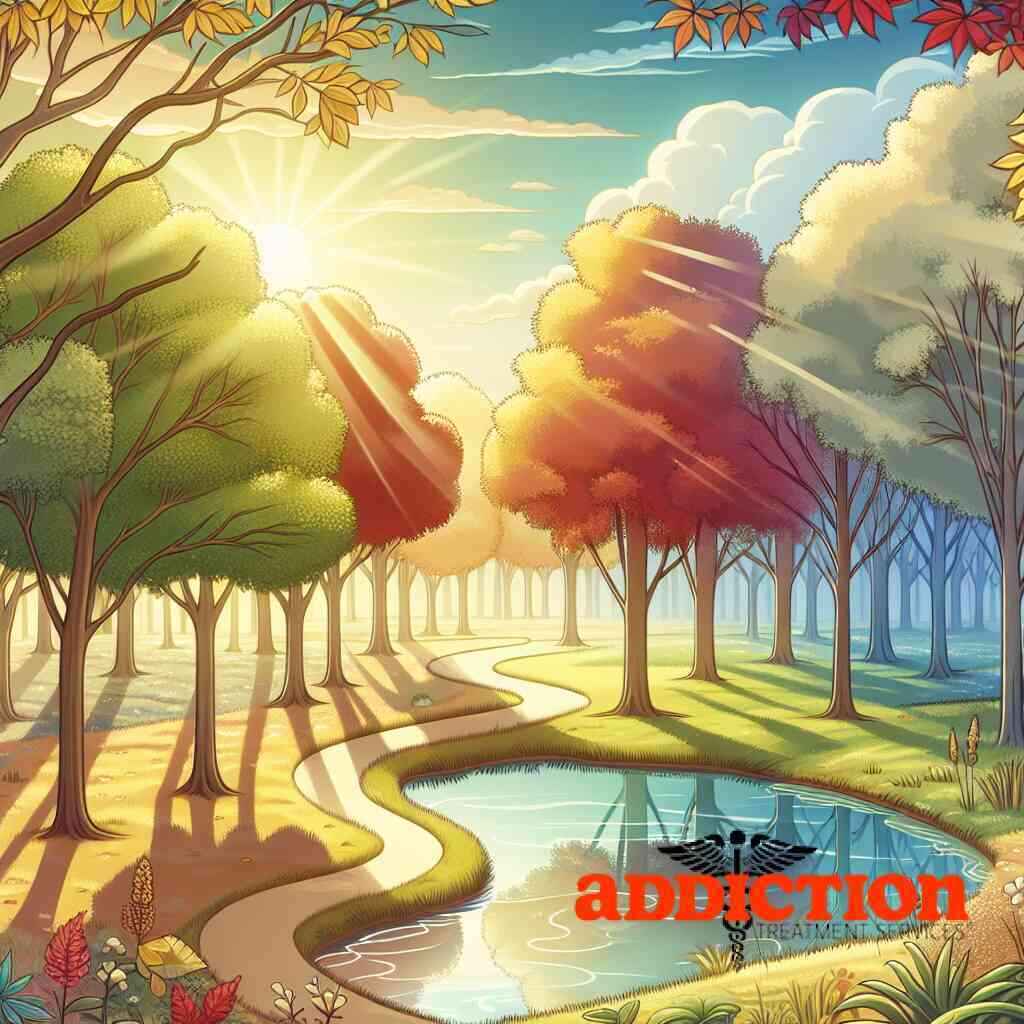 Posted On: 11/13/2024
Posted On: 11/13/2024Embracing the Autumn of Sober Living
Welcoming Change with Open Arms
The autumn season offers a natural metaphor for embracing change, providing a vivid backdrop for those committed to sober living. As the leaves transform into a spectacular display of color, individuals in recovery can find inspiration in nature’s cycles of change. It’s a season that invites introspection, making it an ideal time to reassess personal goals and commitments. Understanding addiction transition can help embrace these changes as part of a larger journey toward sobriety. As the season shifts, it’s crucial to remain adaptable and open to new routines that support a sober lifestyle. Establishing a reflective mindset helps recognize the parallels between the external transformations in nature and the internal journey within.
Reflecting on Your Journey
Reflection is an integral part of the recovery process, allowing individuals to acknowledge their growth and the challenges they’ve overcome. Fall is a fitting time to look back and take stock of one’s journey, identifying lessons learned and areas for continued improvement. This introspection helps reinforce the importance of sobriety and underscores the progress made thus far. It’s a moment to celebrate victories, no matter how small, and to use these achievements as fuel for continued success. Writing in a journal or participating in therapy sessions can aid this process, deepening one’s understanding of personal triggers and resilience. Ultimately, reflecting on your journey provides clarity and direction, motivating individuals to pursue further growth with renewed strength and resolve.
Infusing Nature into Recovery
Nature offers a powerful therapeutic outlet that many in recovery find incredibly grounding and supportive. Incorporating nature-inspired activities into a daily routine can significantly enhance one’s mental and emotional well-being during the fall. Whether it’s a walk through a local park, gardening, or meditation in a natural setting, these moments in nature foster a sense of peace and tranquility. They can also serve as a reminder of the beauty surrounding us, encouraging a mindful appreciation for the present moment. Engaging with nature helps alleviate stress and create positive associations with sobriety. It’s about finding joy in simple pleasures and recognizing the healing power of the natural world as an ally on the path to recovery.
Mindfulness and Emotional Resilience for Autumn Sobriety
Harnessing Mindfulness Techniques for Grounding
In the pursuit of sobriety, mindfulness techniques serve as a powerful tool for grounding and keeping individuals focused during the challenging autumn months. Embracing practices such as deep breathing exercises and meditation can significantly enhance mental clarity and reduce anxiety. With the season’s inherent tranquility, incorporating these techniques into daily routines allows for a more profound connection to the present moment. Mindfulness techniques for sobriety can involve journaling about daily experiences, focusing on sensory details during outdoor walks, or engaging in mindful eating practices. These techniques serve to redirect attention away from cravings, facilitating a nurturing environment for emotional healing. By adopting these practices, individuals can cultivate a state of calm and balance, which fortifies their commitment to a sober lifestyle.
Building Emotional Resilience Against Seasonal Triggers
Autumn often comes with triggers that challenge sobriety, ranging from shorter daylight hours to nostalgic holiday memories. Building emotional resilience during this season is pivotal in maintaining sobriety. Essential Tips for Relapse Prevention in NJ This resilience can be bolstered through regular therapy sessions, fostering an understanding of one’s emotional responses, and devising strategic coping mechanisms. Collaborating with healthcare professionals for recovery can offer tailored approaches to managing these triggers through professional guidance and support. Exploring creative outlets such as arts and crafts or engaging in regular physical fitness routines further reinforces emotional well-being. These activities offer constructive distractions and foster a sense of achievement and joy that counteracts negative emotional states. Ultimately, by preparing for potential triggers and utilizing these strategies, individuals can navigate the autumn months with confidence and strength.
Riding the Emotional Waves: Staying Grounded
Staying grounded amid emotional fluctuations is essential for enduring sobriety during the fall season. Learning to ride these emotional waves involves cultivating awareness and developing strategies to maintain focus amidst life’s ups and downs. Grounding techniques, such as spending time in nature or practicing yoga, provide a soothing backdrop for emotional stability. Embracing psychotherapy techniques for addiction can help individuals process and manage overwhelming feelings in a controlled manner. Moreover, community support networks play a crucial role in providing a support system where individuals can share their experiences, seek advice, and gain emotional comfort. By relying on these various strategies, individuals can maintain equilibrium and a positive outlook as they work towards sustaining their recovery journey during the autumn months.
Constructing a Strong Sober Support System
Engaging with Community Support Networks
Creating and maintaining a robust sober support network is crucial for ongoing sobriety, particularly as the fall brings new challenges and influences. An effective network provides emotional comfort, accountability, and companionship, enabling individuals to stay committed to their recovery journey. Community support groups for sobriety are foundational in offering safe spaces where individuals can share experiences and strategies. These groups cultivate a sense of belonging and connection, which is essential for emotional healing and stability. Online forums and local meetings represent just two examples of how individuals can engage with a supportive community, each offering unique benefits tailored to personal preferences.
Leveraging AA and NA Meetings as Pillars of Strength
AA and NA Meetings serve as profound anchors in the sobriety journey, providing structured support and guidance through peer engagement. These meetings deliver a structured environment where individuals can seek solace during moments of vulnerability and gain insights from others’ experiences. Participation in these gatherings encourages open discussion, motivation, and camaraderie, reinforcing the commitment to sobriety. Joining NA meetings near you can offer convenient and consistent support, ensuring that help is readily accessible as needed. As autumn unfolds, these gatherings become even more invaluable, equipping individuals with the tools and companionship necessary to weather seasonal challenges with resilience.
Building Connections Through Sober Autumn Activities
Fall presents a unique assortment of activities that can be enjoyed sober, further strengthening connections and reinforcing sobriety. Activities such as pumpkin picking, hiking through colorful trails, or participating in sober community events offer meaningful alternatives to traditional social gatherings. These activities foster connections with like-minded individuals, promoting a shared commitment to a healthy, substance-free lifestyle. By engaging in such endeavors, individuals can cultivate lasting relationships and reinforce their support systems. Exploring local events can illuminate opportunities for new friendships and shared experiences, encouraging a vibrant and connected sober community throughout the autumn season.
Navigating the Fall Festivities Alcohol-Free
Embracing Alcohol-Free Fall Celebrations
Fall offers a myriad of opportunities to celebrate while maintaining sobriety. Embracing alcohol-free celebrations allows individuals to enjoy the season’s festivities without compromising their recovery journey. Engaging in activities like corn mazes and and hayrides or visiting local farmers’ markets can provide fun and memorable experiences that reinforce sober living. By participating in these events, individuals can connect with others who share similar goals and deepen their relationships through shared experiences. For those eager to maintain their sobriety, exploring holistic autumn recovery strategies can provide additional insights into integrating wellness and celebration. These gatherings cultivate a sense of community and fulfillment, celebrating the beauty of the season without alcohol.
Preparing for Upcoming Holiday Events with Self-Awareness
The fall season culminates in numerous holiday events that often pose challenges to sobriety. Preparing with self-awareness is crucial for navigating these gatherings successfully. Being mindful of one’s emotional triggers associated with holiday traditions and gatherings is essential. It’s wise to have a plan, such as attending events with a trusted support person or pre-arranging a time to leave if necessary. Embracing holiday event planning for sobriety can offer strategic methods to enjoy these festivities with confidence and caution. Ensuring that one’s environment is conducive to a sober lifestyle, such as suggesting or organizing alcohol-free gatherings, enables individuals to enjoy the holiday season to the fullest without the temptation to stray from their recovery path.
Nature-Inspired Autumn Activities for a Sober Mindset
Nature provides the perfect backdrop for cultivating a sober mindset during the fall season. Engaging with the natural world can foster a sense of peace and fulfillment, reinforcing sobriety. Activities such as hiking, forest bathing, or simply enjoying a picnic amidst fall foliage encourage an appreciation for nature’s splendor. These endeavors align with mindful living, offering opportunities to reflect and connect with oneself and the environment. For those interested in exploring further options, discovering sober alternatives in Illinois can provide a wide range of opportunities to strengthen sobriety in harmony with nature’s rhythms. These nature-inspired activities not only improve mental wellness but also solidify the foundations for lasting recovery, nurturing both body and spirit.
Holistic and Seasonal Self-Care Strategies
Fall Detoxification and Wellness Guidelines
Fall offers an ideal opportunity to realign with wellness through strategic detoxification practices. As the body adjusts to cooler temperatures and changing daylight patterns, understanding detoxification and implementing effective strategies is key for maintaining balance. Detoxification not only helps eliminate toxins accumulated over time but also rejuvenates the body, enhancing mental clarity. It’s crucial to incorporate detoxifying foods such as leafy greens, root vegetables, and herbal teas into your diet. Alongside nutritional choices, engaging in a balanced exercise routine aids in flushing out impurities while boosting circulation and energy levels. By adhering to these fall detoxification guidelines, individuals can support their body’s natural processes, setting a solid foundation for sustained sobriety throughout the season. The Evolution of Detoxification Methods by 2024 Embracing these practices is a significant step towards holistic health and well-being, fortifying both physical and emotional resilience.
Managing Fall Stress Through Holistic Practices
The transition into autumn can bring about stress due to various environmental and social changes. Managing this stress holistically involves incorporating mindfulness techniques for sobriety, such as meditation, yoga, or tai chi. These practices not only relax the body but also center the mind, promoting inner peace and reducing anxiety. Additionally, integrating regular sleep patterns is vital; aim for a consistent routine that ensures adequate rest, which aids in emotional regulation. Aromatherapy with essential oils like lavender and chamomile can be a therapeutic tool in stress reduction, as scents influence mood and overall well-being. Implementing these holistic approaches provides a comprehensive method for coping with seasonal stresses, reinforcing sobriety by enhancing mental health and ensuring emotional stability during the dynamic fall season.
Integrating Seasonal Foods for Optimal Health
An essential aspect of maintaining sobriety through the autumn months is aligning dietary habits with seasonal availability. The integration of seasonal foods such as squash, pumpkins, apples, and cranberries offers a wealth of nutritional benefits that enhance both physical and mental health. These foods, rich in vitamins, antioxidants, and fibers, support detoxification, boost immunity, and stabilize mood, making them invaluable allies in a sober lifestyle. Embracing seasonal produce not only aligns with nature’s rhythm but also encourages mindful eating practices that are crucial in the recovery process. Preparing meals that incorporate these ingredients can become a calming ritual and a chance for creativity, reinforcing healthy habits. By focusing on seasonal nutrition, individuals can harness the natural bounty of fall, ensuring their bodies receive the essential nutrients needed for enduring well-being and sustained sobriety.
Avoiding Pitfalls in Fall Recovery
Identifying and Managing Fall Triggers
The fall season can unwittingly introduce various triggers that threaten sobriety. Identifying these triggers is the first step in managing their impact. Triggers during autumn often stem from environmental changes, routine disruptions, or emotional cues from past associations with holidays. Therefore, developing keen awareness is essential. By understanding personal vulnerabilities, individuals can craft preemptive strategies to safeguard their progress. Engaging with professionals in mental health services for insights into these triggers provides a strategic edge. Additionally, incorporating regular check-ins with oneself or with a trusted support individual ensures these triggers are managed effectively, maintaining sobriety’s integrity.
Relapse Prevention Strategies for Fall 2024
Autumn’s unique challenges necessitate tailored strategies for relapse prevention. Emphasizing proactive measures can significantly deter potential setbacks. Establishing a plan involves recognizing warning signs of relapse early and reinforcing commitment through structured activities and community support. Relapse prevention strategies in autumn include engaging in sober-friendly events and strengthening support networks. Additionally, maintaining open communication with family and peers fosters accountability. Equipping oneself with coping tools, such as mindfulness exercises and hobby engagement, also fortifies emotional resilience against relapse. Ultimately, these strategies empower individuals to confront challenges head-on, sustaining their sobriety throughout the season. Guide to Dual Diagnosis Programs in Michigan
Maintaining Momentum in Your Recovery Process
Maintaining momentum during recovery is crucial, especially as external factors fluctuate with the seasons. Sustaining rhythm in recovery requires ongoing dedication and effort. Regularly attending community support groups for sobriety ensures a consistent reaffirmation of sobriety goals amidst changing circumstances. Additionally, incorporating a dynamic approach to self-care, from exploring new hobbies to participating in seasonal activities, invigorates the recovery journey. Staying motivated can also hinge on setting realistic goals and celebrating milestones, providing a continuous source of encouragement. By balancing routine with adaptability, individuals can preserve their progress, ensuring their journey remains vibrant and forward-moving.
Concluding the Autumn of Sobriety

Reflecting on Growth and New Beginnings
As autumn comes to a close, it’s an opportune moment to reflect on personal growth and new beginnings achieved during this season of sobriety. This period of reflection helps individuals acknowledge the challenges they’ve faced and the resilience needed to overcome them. Celebrating these victories, both big and small, fosters a sense of accomplishment and motivation for what’s to come. By understanding the importance of sober houses as supportive environments, individuals can appreciate the stability and community these spaces offer, reinforcing their commitment to sobriety. This reflection not only marks the progress made but also sets the stage for continued growth, emphasizing that recovery is a perpetual journey rich with opportunities for personal enhancement and renewed purpose.
Setting Sights on Continued Success for the Seasons Ahead
Looking forward, setting sights on continued success involves planning for sobriety beyond the fall. As winter approaches, individuals should strategize to maintain their progress by embracing new goals and reinforcing established coping strategies. Leveraging community support, such as joining a sober support network in Michigan, offers ongoing encouragement and resources necessary for a sober lifestyle. These networks provide invaluable support systems and educational opportunities, helping individuals stay focused and connected. Moreover, by fostering a proactive mindset, individuals can anticipate challenges and embrace them as chances for further development. Exploring Innovations in Addiction Treatment Near Me Ultimately, effective planning and community integration form the backbone of sustained sobriety, ensuring that each season ahead is met with strength, resilience, and unwavering commitment to a healthy, fulfilling life.
Frequently Asked Questions
Question: What are some fall sobriety tips that Addiction Treatment Services recommends for maintaining recovery during the changing seasons?
Answer: At Addiction Treatment Services, seasonal changes present unique challenges and opportunities for sobriety. We recommend embracing nature-inspired activities to reinforce recovery. Engaging in outdoor exercise, such as hiking or meditating in a natural setting, can foster mental clarity and stress reduction. Explore the Rise of E-Therapy in Addiction Care. Additionally, leveraging mindfulness techniques like deep breathing and journaling helps maintain focus and emotional resilience. Incorporating these fall sobriety tips into daily routines supports ongoing sobriety while appreciating the beauty of the changing seasons. Our addiction treatment centers can guide you through personalized seasonal sobriety success plans to sustain long-term recovery.
Question: How can individuals build strong sober support systems during the fall, according to Addiction Treatment Services?
Answer: Building a robust sober support system is crucial, especially as fall introduces new social challenges. Addiction Treatment Services emphasizes the importance of engaging with community support networks such as AA and NA meetings, which provide shared experiences and accountability. Additionally, participating in sober community events, like sobriety-friendly autumn activities, fosters connections with like-minded individuals. These activities offer companionship and motivation crucial for sustainable recovery. Our addiction recovery services provide directories to connect you with local support groups, ensuring you have access to help whenever needed. By relying on these services, you can create a comprehensive support network tailored to your recovery journey.
Question: What are the recommended mindfulness practices for sobriety during the fall months?
Answer: Mindfulness practices play a significant role in maintaining sobriety during fall, a time when emotional fluctuations and triggers are common. Addiction Treatment Services suggests incorporating meditation, yoga, and mindful eating into daily life. Reflective practices such as journaling or forest bathing can deepen the connection to the present moment and divert attention from substance-related cravings. Discover the Best Rehab Centers Near Me in Nevada. Working with our behavioral health services can provide professional guidance to implement these techniques effectively. By adopting these practices, individuals fortify their emotional resilience, providing a solid foundation for ongoing sobriety throughout fall and beyond.
Question: How can holistic fall sobriety strategies help manage stress and enhance mental well-being?
Answer: Addiction Treatment Services advocates for holistic fall sobriety strategies that integrate mind, body, and spirit wellness to manage stress and enhance mental health. Techniques such as incorporating seasonal foods rich in antioxidants, engaging in detoxification practices, and exercising regularly can significantly boost physical health, which in turn supports mental stability. The Evolution of Detoxification Methods by 2024 Additionally, incorporating aromatherapy or splitting time between nature and community support helps elevate mood and reduce stress. These strategies foster a holistic approach to recovery, harmonizing physical and emotional health and ensuring sustained sobriety during the fall transition. Ultimate Guide to Holistic Addiction Treatment
Question: In the blog titled “What Are the Essential Tips for Fall 2024 Sobriety?” how does Addiction Treatment Services suggest avoiding pitfalls during autumn recovery?
Answer: In our blog “What Are the Essential Tips for Fall 2024 Sobriety?” Addiction Treatment Services highlights the importance of identifying and managing fall triggers to avoid relapse. We recommend proactive strategies such as regular self-check-ins, leveraging medication-assisted treatment if needed, and staying actively involved in treatment programs. Engaging in sober-friendly events and strengthening support networks with family and peers fosters a nurturing environment for recovery. By preparing for challenges and implementing these relapse prevention strategies, individuals can confidently navigate the fall season, maintaining momentum in their recovery process while utilizing the support and resources offered by our addiction recovery services.



